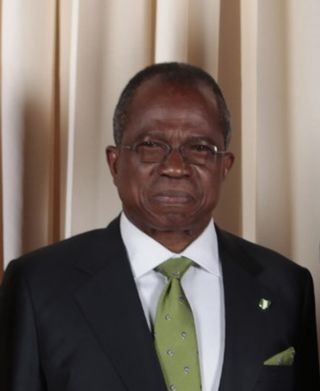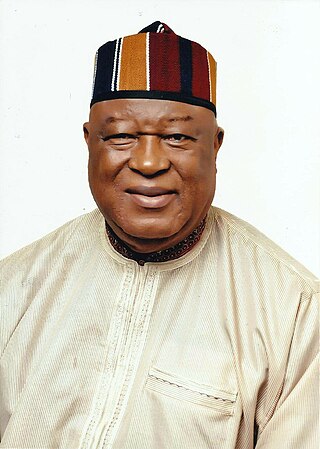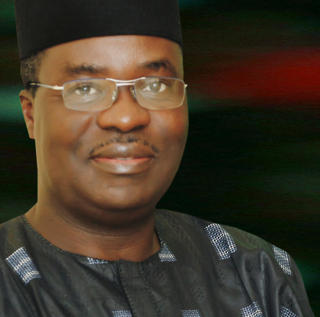
Elections in Nigeria involve choosing representatives to the federal government of Nigeria and the various states in the fourth republic Nigeria. Elections in Nigeria began in 1959 with a number of political parties. It's a method of choosing leaders where the citizens have right to vote and to be voted for. For 2023, Nigerians are getting ready for presidential elections with about 93.4 million eligible voters across the federation for the 25 February election.

Umaru Musa Yar'Adua ; 16 August 1951 – 5 May 2010) was a Nigerian politician who served as the president of Nigeria from 2007 to 2010. He was declared the winner of the Nigerian presidential election held on 21 April 2007, and was sworn in on 29 May 2007.
Sam Ominyi Egwu CON is a Nigerian politician and member of People's Democratic Party (PDP) in Nigeria. He was elected Governor of Ebonyi State in the 1999 Ebonyi State gubernatorial election from 29 May 1999 to 29 May 2007. Dr Egwu is noted as pillar of educational development in Ebonyi state and Nigeria. He attended the University of Nigeria, Nsukka where he obtained a bachelor's degree in Agriculture in 1981. He later received a master's degrees in Agricultural from the University of Nigeria, Nsukka in 1987 and Doctorate in Agronomy from Enugu State University of Technology in 1996. He was a senior lecturer at Enugu State University of Technology and served as commissioner for education in Ebonyi state contributed to the successes recorded in education sector during his tenure as governor.

Babagana Kingibe OV GCON is a Nigerian diplomat, politician and civil servant who has held several high ranking government offices, culminating in his appointment as the Secretary to the Government of the Federation from 2007 to 2008. He spent over a decade in the Foreign Service cadre and has been in politics since the 1970s serving six heads of state; most recently as a member of the inner circle of President Muhammadu Buhari.

Atiku Abubakar ; born 25 November 1946) is a Nigerian politician and businessman who served as the vice president of Nigeria from 1999 to 2007 during the presidency of Olusegun Obasanjo. He ran as governor of Adamawa State in 1990, 1996, and in 1998, when he was finally elected before he became Obasanjo's running mate during the 1999 presidential election and was re-elected in 2003.
Sule Lamido is a Nigerian politician who served as the governor of Jigawa State from 2007 to 2015. He previously served as the foreign affairs minister of Nigeria from 1999 to 2003. He is a member of the Peoples Democratic Party.

General elections were held in Nigeria on 21 April 2007 to elect the President and National Assembly. Governorship and State Assembly elections had been held on 14 April.

The Action Congress of Nigeria (ACN), formerly known as Action Congress (AC), was a Nigerian political party formed via the merger of a faction of Alliance for Democracy, the Justice Party, the Advance Congress of Democrats, and several other minor political parties in September 2006. The party controlled Lagos. It was regarded as a natural successor to the progressive politics more closely associated with the Action Group and Unity Party of Nigeria (UPN) led by Chief Obafemi Awolowo in the First and Second Republics respectively. However, criticism of the party's more pragmatic and less ideological political outlook associated with AG and UPN, has made many argue it was less of a worthy political heir. The Party had strong presence in the South West, Mid-West and North Central Regions. Lagos, Edo, Ekiti, Kogi, Ondo, Bauchi, Plateau, Niger, Adamawa, Oyo and Osun states by far accounts for majority of the party's presence and discernible power base.
The Social Democratic Party of Nigeria (SDP) is a centre-left political party in Nigeria. It was created alongside the National Republican Convention by former military president Ibrahim Babangida, as part of a democracy project meant to form two detribalized political parties – one slightly to the left and one to the right. During the Nigerian Third Republic it was seen as a moderate party attractive to young radical intellectuals and socialists. In its manifesto, it called for concerted efforts to improve welfare and fight for social justice.

The Fourth Republic is the current republican government of Nigeria. Since 1999, it has governed the country according to the fourth republican constitution. It was in many ways a revival of the Second Republic, which was in place between 1979 and 1983 and suffers many of the same problems, such as multiple ministries which made policy planning difficult. Nigeria adopted the constitution of the Fourth Republic on 29 May 1999.

The Independent National Electoral Commission (INEC) is the electoral body which oversees elections in Nigeria. It was established in 1998 shortly before Nigeria's transition from military to civilian rule.

Chief Ojo Maduekwe was a Nigerian politician of Igbo origin, from Ohafia, Abia State.
Ephraim Omorose Ibukun Akpata was a Justice of the Supreme Court of Nigeria and the first chairman of the Independent National Electoral Commission (INEC) of Nigeria, responsible for the 1998/1999 elections that re-introduced democracy in May 1999.
Anyim Pius Anyim is a Nigerian politician who served as the 9th president of the Nigerian Senate from 2000 to 2003, he was Secretary to the Government of the Federation (SGF) during Goodluck Jonathan presidency. He was elected Senator on the platform of the Peoples Democratic Party (PDP) in 1999 for the Ebonyi South constituency of Ebonyi State and was elected president of the Senate in August 2000.

Lawali Shuaibu is a Nigerian politician who was elected senator for the Zamfara North Senatorial District of Zamfara State, Nigeria at the start of the Nigerian Fourth Republic, running on the All People's Party (APP) platform. He took office on 29 May 1999. He was re-elected on the All Nigeria People's Party (ANPP) platform in 2003 to a second term of four years.

Presidential elections were held in Nigeria on 16 April 2011, postponed from 9 April 2011. The election followed controversy as to whether a northerner or southerner should be allowed to become president given the tradition of rotating the top office between the north and the south after the death of Umaru Yar'Adua, a northerner, when Goodluck Jonathan, another southerner assumed the interim presidency.

Barnabas Andyar Iyorhyer Gemade is a Nigerian politician, formerly National Chairman of the People's Democratic Party (PDP), who was elected Senator for the Benue North East constituency of Benue State, Nigeria on 9 April 2011 national elections. He is currently a member of All Progressive Congress (APC)

Owelle Rochas Anayo Okorocha is a Nigerian politician of Igbo extraction, from Imo State. He is the senator representing Imo West senatorial district at the 9th Nigerian Senate. From 2011 to 2019 he served as Governor of Imo State.
Buba Galadima is a Nigerian politician who was National Secretary of the Congress for Progressive Change (CPC) a party formed in the run-up to the 2011 national elections as a leading platform for former military ruler and President of Nigeria General Muhammadu Buhari. He was the Spokesperson of the People's Democratic Party.

Bashir Yusuf Ibrahim is a Nigerian politician and businessman. He was the National Chairman of Peoples Democratic Movement (PDM), a Nigerian political party.
















